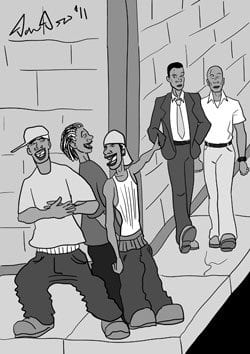
An emerging new era
A tectonic shift is occurring in the attitudes of African Americans, and few seem to openly acknowledge the change. The fissure is along class lines. Some activists fear that there will be a breach in the black voting bloc if they recognize the change as valid.
The Pew Research Center found in a November 2007 study that 61 percent of blacks interviewed believe that the values of middle class and poor blacks have become increasingly different. Nonetheless, 53 percent believe that blacks can still be thought of as a single race. However, another 37 percent believe that they are not.
Another poll about two years later, pointed out the importance to blacks of economic differences. As many as 65 percent of the respondents cited the discord between rich and poor as a divisive factor in society, even more significant than the conflict between blacks and whites.
In yet another study, black respondents set a very tough standard for others. Only 30 percent stated that racial discrimination is a valid reason for failure, and 53 percent asserted that blacks are responsible for their own failure.
Clearly, protest politics has little appeal to this emerging group. Many are too young to have personal knowledge of the civil rights movement when demonstrations and civil disobedience were important strategies. Now the people want results: better education opportunities, better jobs and better housing. Now they cope with racial discrimination with lawsuits and political action.
In his new book, “Disintegration: The Splintering of Black America,” Pulitzer Prize-winning journalist Eugene Robinson has determined that the split in black America has created four groups. They are a middle-class “mainstream” majority; a large impoverished minority; a tiny highly successful elite; and an emerging group of immigrants and multi-racials.
He points out that over the past 40 years, the percentage of blacks earning more than $35,000 in today’s dollars expanded by 20 percent — from 25.8 to 45.3 percent. And black households earning more than $75,000 rose from 3.4 to 15.7 percent. Black affluence continues to grow.
Unfortunately, the number of those in poverty has not declined. In 2009, 25.8 percent of blacks lived below the poverty level, which is $17,285 for a single parent with two children and $21,756 if both parents are part of the household.
More affluent blacks are still sympathetic to the plight of those experiencing hard times. However, the data indicate less tolerance for those whose difficulties were created by their own bad decisions.
A new development is that achieving African Americans are able to appreciate the power of positive thinking. They understand that protest politics has an inescapably negative aspect. There must be a harmful condition that the people lack the power to change, so they must appeal to others for remedial action.
With the economic recession still raging, a Pew Research Center report published last June found that while whites were more pessimistic, blacks were “more upbeat about the idea of intra-family intergenerational progress than are whites.” This irrepressible black optimism, energized by the still emerging black middle class, provides a grand opportunity for young political leaders to reject protest politics and develop solutions for progress inspired by the enthusiasm of blacks for real advancement.






